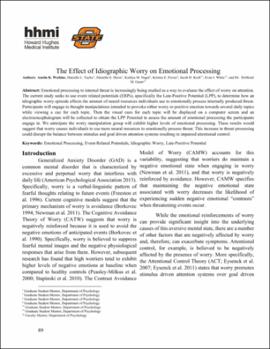| dc.contributor.advisor | Taylor, Danielle L. | |
| dc.contributor.advisor | Deros, Danielle E. | |
| dc.contributor.advisor | Nagel, Kaitlyn M. | |
| dc.contributor.advisor | Frosio, Kristen E. | |
| dc.contributor.advisor | Kraft, Jacob D. | |
| dc.contributor.advisor | White, Evan J. | |
| dc.contributor.advisor | Grant, DeMond M. | |
| dc.contributor.author | Watkins, Austin K. | |
| dc.contributor.other | HHMI Life Science Freshman Research Scholars | |
| dc.date.accessioned | 2019-07-22T17:02:54Z | |
| dc.date.available | 2019-07-22T17:02:54Z | |
| dc.date.issued | 2019-04-27 | |
| dc.identifier | oksd_hhmi_2019_watkins | |
| dc.identifier | oksd_hhmi_2019_watkins_poster | |
| dc.identifier.citation | Watkins, A. K., Taylor, D. L., Deros, D. E., Nagel, K. M., Frosio, K. E., Kraft, J. D., White, E. J., & Grant, D. M. (2019, April 27). The effect of idiographic worry on emotional processing. Paper presented at the HHMI Life Science Freshman Research Scholars Symposium, Stillwater, OK. | |
| dc.identifier.uri | https://hdl.handle.net/11244/321033 | |
| dc.description.abstract | Emotional processing to internal threat is increasingly being studied as a way to evaluate the effect of worry on attention. The current study seeks to use event related potentials (ERPs), specifically the Late-Positive Potential (LPP), to determine how an idiographic worry episode effects the amount of neural resources individuals use to emotionally process internally produced threat. Participants will engage in thought manipulations intended to provoke either worry or positive emotion towards several daily topics while viewing a cue for each topic. Then the visual cues for each topic will be displayed on a computer screen and an electroencephalogram will be collected to obtain the LPP Potential to assess the amount of emotional processing the participants engage in. We anticipate the worry manipulation group will exhibit higher levels of emotional processing. These results would suggest that worry causes individuals to use more neural resources to emotionally process threat. This increase in threat processing could disrupt the balance between stimulus and goal driven attention systems resulting in impaired attentional control. | |
| dc.description.sponsorship | Howard Hughes Medical Institute Science Education Program | |
| dc.format | application/pdf | |
| dc.language | en_US | |
| dc.publisher | Oklahoma State University | |
| dc.rights | In the Oklahoma State University Library's institutional repository this paper is made available through the open access principles and the terms of agreement/consent between the author(s) and the publisher. The permission policy on the use, reproduction or distribution of the article falls under fair use for educational, scholarship, and research purposes. Contact Digital Resources and Discovery Services at lib-dls@okstate.edu or 405-744-9161 for further information. | |
| dc.title | Effect of idiographic worry on emotional processing | |
| osu.filename | oksd_hhmi_2019_watkins.pdf | |
| osu.filename | oksd_hhmi_2019_watkins_poster.pdf | |
| dc.description.department | Psychology | |
| dc.type.genre | Research report | |
| dc.type.genre | Presentation | |
| dc.type.material | Text | |
| dc.subject.keywords | emotional processing | |
| dc.subject.keywords | event-related potentials | |
| dc.subject.keywords | idiographic worry | |
| dc.subject.keywords | late-positive potential | |

